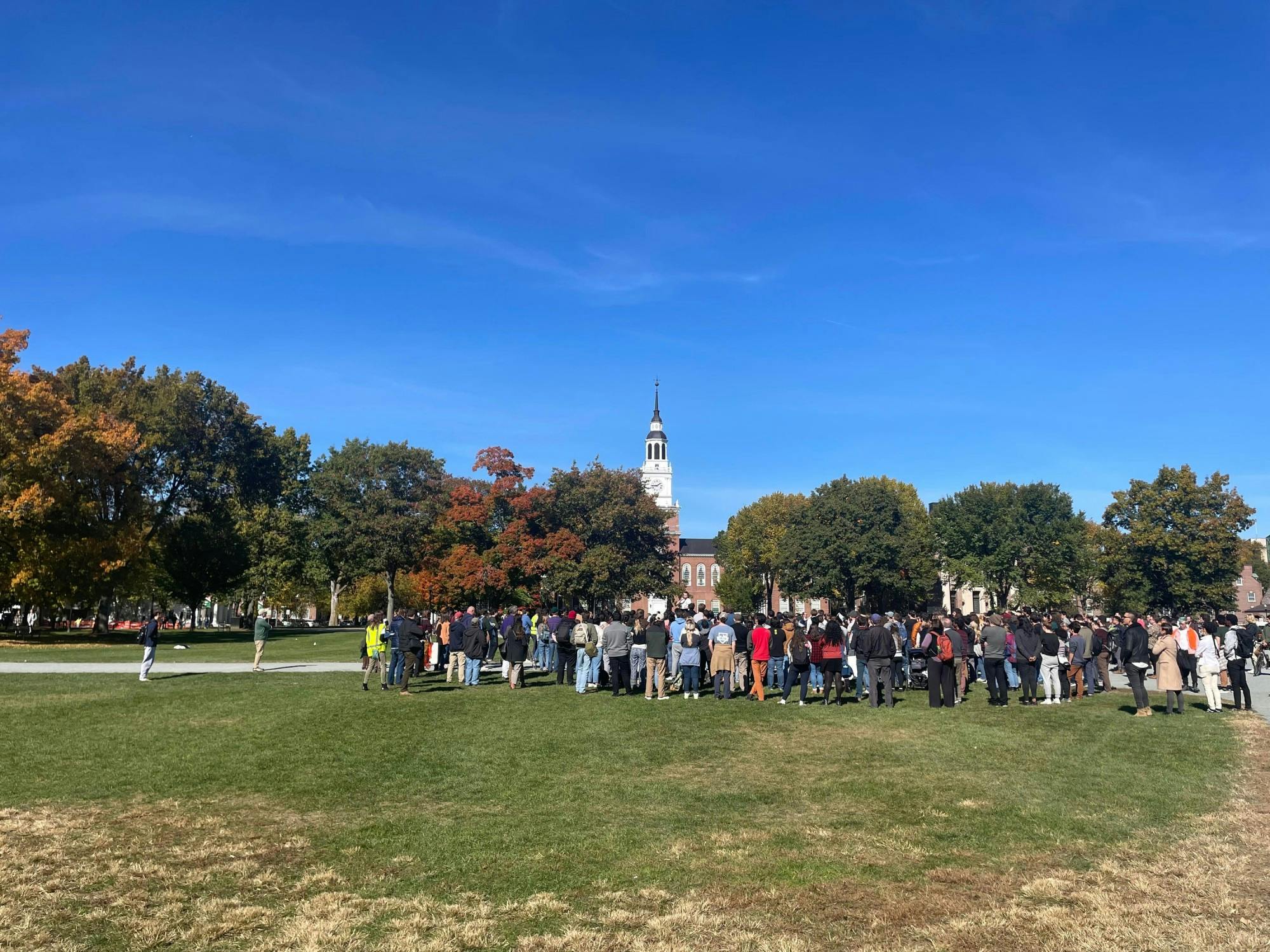This article is featured in the 2022 Homecoming special issue.
On Oct. 11, the Graduate Organized Laborers at Dartmouth staged a walkout on the Green to publicize their misgivings about their current relationship with the College and to make their intentions to form a union known.
Members of GOLD collected pledge card signatures — which signify students’ support for a union — and spoke about their four central demands: a guaranteed living wage, comprehensive benefits, a safe and equitable workplace and fairness for international students, according to committee member and third-year microbiology P.h.D. student Rendi Rogers.
Rogers said that graduate students currently have limited vision insurance, no dental coverage and no subsidized child care. She said GOLD is requesting more comprehensive benefits and demanding supplemental aid for international graduate students, as the College “doesn’t offer any support for getting visas, paying visa fees or getting immediate family visas.”
Since sexual harrasment, abuse, discrimination, overworking and unreasonable hours have been issues in the past, GOLD hopes that the union would both protect and empower students, Rogers added.
“We got over half of graduate workers to sign cards in the first week,” Rogers said. “We’re hoping for voluntary recognition from the College, but if that doesn’t happen, we will send in the cards as a petition to the National Labor Relations Board so that we can call for an election to vote on a union.”
Graduate student unionization efforts follow successful organizing by undergraduate Dartmouth student employees earlier this year. Undergraduates working for Dartmouth Dining Services banded together to form the Student Worker Collective at Dartmouth to demand higher wages and better working conditions, according to Christopher Peck, president of Service Employees International Union Local 560.
Peck — whose union represents non-student employees at the College — said that his division has met with representatives of GOLD several times “to help them organize.”
According to Rogers, GOLD’s top-line issue is a guaranteed living wage, with the organization demanding “an immediate cost of living adjustment” of $1,668 per month added to graduate students’ stipends. She added that many graduate students are currently classified as “rent burdened” — according to the Federal Reserve threshold — since they spend more than 30% of their income on housing to live in Hanover.
GOLD organizer Logan Mann, a second year student at Thayer, said that graduate students often view their positions at the College as an ideal academic opportunity before realizing the underlying costs.
“I think for a lot of people coming out of undergrad or masters this sounds like a really sweet deal, because it’s sort of phrased as a scholarship, but it’s actually a job,” Mann said. “Ph.D. students teach and do research but for very, very low pay.”
Additionally, GOLD aims to secure a contractual “guaranteed annual raise” which will match inflation of the cost of living in Hanover, Rogers said.
Fellow union organizer and fifth-year ecology, evolution, environment and society P.h.D. student Christopher Callahan said that the median rent for a single bedroom in Hanover is $1,300, which is over half of an average graduate student’s monthly stipend.
“The Upper Valley housing market is really constrained,” Calahan said. “The situation does get a little bit better if you move farther from Hanover to Lebanon, West Lebanon, White River Junction or Norwich, but the lack of public transportation in the area means that what you save on rent, you end up paying in car insurance, car payments, gas, parking.”
When he first enrolled in his Ph.D. program, Mann said he expected housing in the Upper Valley to be cheaper, but costs quickly became a concern.
“I was quickly disillusioned and ended up bouncing around from sort of unstable, temporary housing options,” he said.
Mann, who spoke at the Oct. 11 rally, said he was “impressed” by the event’s turnout. Over 400 graduate students signed pledge cards out of an estimated 800 to 1,000 total students who are paid and on campus, he added.
“The high number of cards has hopefully convinced Dartmouth that interfering in this process will not work, and that the writing is on the wall,” Mann said.
Despite their working relationship, GOLD has not officially partnered with SEIU 560, and the group is instead part of the Electrical, Radio & Machine Workers of America — which “is more set up for graduate students,” Peck said.
“I think the College has to start investing in their employees, whether they’re undergrads, graduate students or service workers or administration,” Peck said. “It’s tough times right now, and it would be good if the College started investing in people.”




